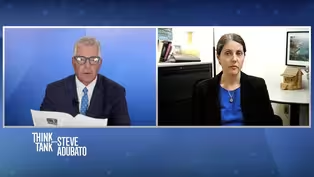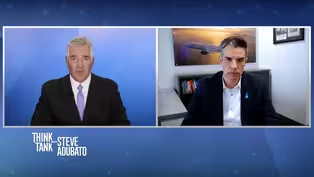
Christine Guhl-Sadovy addresses rising utility costs in NJ
Clip: 8/30/2025 | 9m 20sVideo has Closed Captions
Christine Guhl-Sadovy addresses rising utility costs in NJ
Steve Adubato is joined by Christine Guhl-Sadovy, President of the New Jersey Board of Public Utilities, to discuss rising utility costs, growing energy demands, and other pressing energy issues.
Problems playing video? | Closed Captioning Feedback
Problems playing video? | Closed Captioning Feedback
Think Tank with Steve Adubato is a local public television program presented by NJ PBS

Christine Guhl-Sadovy addresses rising utility costs in NJ
Clip: 8/30/2025 | 9m 20sVideo has Closed Captions
Steve Adubato is joined by Christine Guhl-Sadovy, President of the New Jersey Board of Public Utilities, to discuss rising utility costs, growing energy demands, and other pressing energy issues.
Problems playing video? | Closed Captioning Feedback
How to Watch Think Tank with Steve Adubato
Think Tank with Steve Adubato is available to stream on pbs.org and the free PBS App, available on iPhone, Apple TV, Android TV, Android smartphones, Amazon Fire TV, Amazon Fire Tablet, Roku, Samsung Smart TV, and Vizio.
Providing Support for PBS.org
Learn Moreabout PBS online sponsorship- Hi, everyone, Steve Adubato.
We're joined once again by Christine Guhl-Sadovy, who is president of the New Jersey Board of Public Utilities.
Christine, how are you doing?
- I'm doing well.
Thanks, Steve, how are you?
- I'm doing great.
Hey, Christine, we're taping this program at the end of June 2025.
Help put it in perspective for people the increases that people are seeing in their utility bills.
We've had several people on trying to explain it.
Help us understand.
- Of course, Steve.
So on the 1st of June, rate increases went into effect related to something called the PJM auction, which is PJM is the regional transmission operator for this region.
And they do an auction every year to determine how much electricity we have and how much electricity we need.
- So hold on one second.
I'm sorry for interrupting.
13 states, approximately 65 million customers, right?
- Yeah, very big regional transmission operator.
- PJM.
Go ahead.
- Yeah, it stands for Pennsylvania-Jersey-Maryland.
- How does this auction work?
So electricity generators of all different varieties, they might be gas plants, they might be solar, they might be onshore wind, bid into an auction process, the amount of available electricity capacity that they are putting forward.
And then based on the amount of capacity that we need, an auction price is set.
The auction last year results were almost 10 times higher than the previous year.
- Because?
- So for a number of reasons, some is just, you know, it's a market, so supply and demand.
We have growing demand attributable really primarily to data center growth in the PJM region outside of New Jersey, Ohio and Virginia.
And, you know, we need more supplies.
So we need more electricity.
There are also a number of rules within the market structure of PJM that have potentially artificially suppressed some of the available demand.
So not all of the resources were bid into the auction.
And so that combination of an actual supply and demand crunch and some artificial scarcity led to some very high prices that translate into higher customer bills right now in June.
- Okay, so let's do this, a couple of things first.
For those you who are watching right now, Christine Guhl-Sadovy is president of Board of Public Utilities in New Jersey.
And let me disclose that we have been doing public awareness and public education around clean energy through PSA, public service announcement spots from the Clean Energy Program, which is really run by the Board of Public Utilities.
But here's the thing that I keep trying to make sense of.
See how you talked about the data centers; actually, our colleagues at NJ Spotlight News just did a really great report on it, check out NJ Spotlight News, go on their website and check this out, on data centers.
I'm thinking, "What?
What does a data center, particularly with AI exploding, Christine, what the heck does that have to do with energy utility rates?
- Yeah, so that's a great question.
And to be clear, you know, data centers are providing a lot of, you know, AI technology and a lot of economic development opportunities throughout the region.
But they are enormous electricity users.
And, you know, they have a very high electricity use profile.
It's high at all times.
So, you know, it's not like electric charging or air conditioning where it ebbs and flows.
And so they use a lot of electricity.
Some data centers use an entire power plant's worth of electricity.
And they are being built throughout the PJM region and actually throughout the country.
And as a result, we are needing more electricity to supply for those data centers primarily.
- Let me ask you this, because, again, the website's up for the BPU, the Board of Public Utilities.
What are utility assistance days?
- So those, I think, Steve, those are educational public awareness days that we have done throughout the state in conjunction with the Department of Community Affairs to help to provide information about all the assistance programs that the state of New Jersey has and to help people if they need assistance filling out their applications, providing the appropriate information to get assistance.
We are going into the communities around the state to provide that assistance for people.
- So the 211, New Jersey's Utility Assistance Programs include... What the heck?
When you dial 211, what happens?
- So you get directed to, that's actually the DCA hotline.
So you get directed to available assistance programs to help you either fill out an application, figure out whether you're eligible, provide information to you.
- Okay, let's keep talking about assistance programs, particularly for folks, this has to do with income eligibility.
What is the Comfort Partners Program, Christine?
- So the Comfort Partners Program is an energy efficiency program.
So we have both assistance programs to provide direct repay or relief in the form of bill credits, like the Universal Service Fund.
And then we also have a number of energy efficiency programs, and one of them is an income-eligible program that is Comfort Partners.
And that program provides energy efficiency upgrades at no cost to the homeowner so that they can both, you know, have a more comfortable home, a more efficient home, and save money on their electric.
- And for seniors?
- For income eligible, yes.
- Okay, so for seniors or those on fixed income.
What the heck is the Universal Service Fund?
- That's the state's energy assistance program.
It is for income-qualifying customers, utility customers.
The qualification is 60% of state median income.
So that could be for seniors.
It could be, you know, other low- and moderate-income customers.
And it provides a bill credit, a monthly bill credit, both were either electric and gas.
And actually, we just expanded this program, which is a really exciting development to increase the minimum bill credit: it was $5 a month for each electric and gas, and now it's $20 a month.
And the maximum bill credit went from $180 to $200.
- In the time we have left, let me ask you this, Christine.
We had Michael Renna, I just told you I had Michael Renna from South Jersey Industries.
You regulate them and a whole range of other folks, PSE&G, New Jersey Natural Gas, a whole bunch of organizations, and on the utility side, plus telecommunications as well?
- Yes.
- Okay.
So here's the thing I was talking to Michael about, and I want you to help us on this, a minute left.
Helping the public understand energy policy utility rates is complex, hard stuff, but important, correct?
- Absolutely.
It is a very, very complicated regulatory framework, but the important thing for us at the BPU is for customers to know that we're there to help support them, right?
We want people to know that when they turn the lights on their electricity's going to work, it's going to be reliable, and they're going to be able to afford it.
Same thing with gas, water, and, you know, and all of the utilities.
- Christina, I want to thank you for joining us again.
The Board of Public Utilities is an important entity in our state, and it impacts our lives in so many ways.
Thanks so much, Christine, for joining us.
Appreciate it.
- Thanks, Steve.
Always great to see you.
- You got it.
Stay with us, we'll be right back.
- [Narrator] Think Tank with Steve Adubato is a production of the Caucus Educational Corporation.
Funding has been provided by Congress Hall.
A Cape Resorts property.
The New Jersey Economic Development Authority.
The Port Authority of New York and New Jersey.
Valley Bank.
RWJBarnabas Health.
Let’s be healthy together.
Newark Board of Education.
Delta Dental of New Jersey.
NJM Insurance Group.
And by New Jersey Sharing Network.
Promotional support provided by New Jersey Monthly.
And by BestofNJ.com.
- How long you been waiting?
- About a half hour.
- Brutal.
This keeps up, I'm gonna miss my pickleball game.
- I've been waiting eight years for a kidney.
What can you do?
(gentle music) - [Narrator] Over 100,000 people in the US are waiting for a life-saving transplant.
But you can do your part in an instant.
Register as an organ donor today at NJSN.org.
Examining recent Supreme Court rulings and its impact on NJ
Video has Closed Captions
Clip: 8/30/2025 | 11m 27s | Examining recent Supreme Court rulings and its impact on NJ (11m 27s)
United Airlines VP of Newark Airport Operations talks delays
Video has Closed Captions
Clip: 8/30/2025 | 7m 57s | United Airlines VP of Newark Airport Operations addresses delays and safety concerns (7m 57s)
Providing Support for PBS.org
Learn Moreabout PBS online sponsorship
- News and Public Affairs

Top journalists deliver compelling original analysis of the hour's headlines.

- News and Public Affairs

FRONTLINE is investigative journalism that questions, explains and changes our world.












Support for PBS provided by:
Think Tank with Steve Adubato is a local public television program presented by NJ PBS

